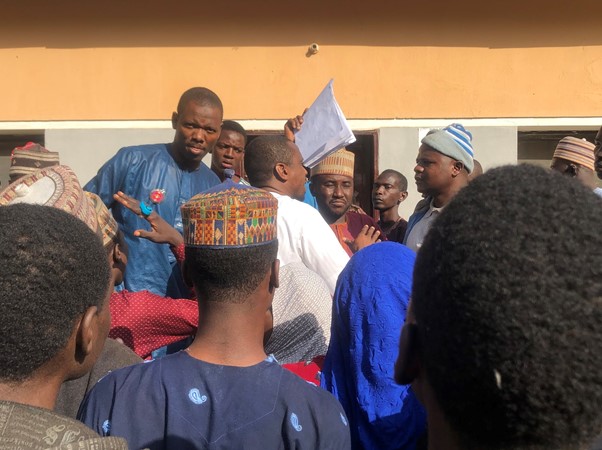NIN Registration: How Kano People Ignore COVID-19 Protocols

The National Identity registration is currently leading to violation of COVID-19 protocols in Kano State, Northwest Nigeria, as many citizens rush to beat the December 30 deadline earlier set by the Federal Government.
Nigeria’s Government through the Nigeria Communication Commission (NCC) had issued a two-week ultimatum to all mobile phone users to register their lines with their identity by December 30 or risk being cut-off.
The NCC had said more controls over SIM-card ownership were needed to secure electronic transactions and curb crime as insecurity bites harder in the country.
The Boko Haram insurgency has been said to have been reinforced by the volatile telecom services.
Retracing its steps following public backlash, however, the government announced on Monday evening that it was extending the deadline for the provision of NIN till January 19 and February 9, 2021, depending on whether subscribers already had the identification numbers.
The original directive was the outcome of a meeting of key stakeholders in the communications industry convened by Isa Ali Pantami, the Minister of Communications and Digital Economy, who argued it was for the best of all.
The development has drawn mixed reactions from many Nigerians who called the new directive superfluous at a time the country is struggling to stay afloat of a second wave of the COVID-19 pandemic.
With a population of 200 million, Nigeria has over 198 million active mobile lines, according to data from the National Bureau of Statistics (NBS).
But only 42 million people have registered for the identity cards as of October 2020.
Though the government had promised to increase manpower for the enrolment of NINs to reach the 2.5 million target per month, away from 500,000 people it currently registers each month.
The Rush To Beat Deadline
To avoid being disconnected from the communication networks, Nigerians have been trooping to many enrolment centres to get their National Identity Number (NIN). But the registration has been cumbersome as those centres attract hordes of people while the extant COVID-19 protocols have been ignored.
HumAngle observed that as hundreds of people rushed to be registered in clear violation of the rule that allows not more than 50 in a gathering, a lot of people at the office of the National Identity Management Commission (NIMC) in Kano did not wear face masks and were not observing social distancing measures as prescribed by the Nigeria Centre for Disease Control (NCDC).
In what many described as a ‘typical’ Nigerian way of losing guards, NIMC offices visited by HumAngle were without hand sanitizer for visitors and staff of the Commission could also be seen without face masks.
Mubarak Isa, an enrolee for NIN told HumAngle that he forgot his face mask at home as he was rushing to be at the NIMC office as early as 3 am.
“Social distancing is not possible here. If you leave your position some people are there to jump the queue,” said a registrant who preferred anonymity.
This is coming as the federal government, on Monday, ordered the closure of bars, nightclubs, and restaurants across the country and reduced the number of guests at weddings, conferences and large gatherings to not more than 50 due to the second wave of COVID-19 currently being experienced in the country.
According to the Boss Mustapha, the chairman of the Presidential Task Force on COVID-19, the number of COVID-19 cases detected in the country in the past two weeks indicates that a second wave of the outbreak has begun.
A data by the NCDC revealed Kano State recorded 16 positive cases of COVID-19 on Sunday.
Last week, the Kano State Government ordered the closure of public and private schools; an order seen by many as being influenced by the sudden and recent upsurge in the positive cases of COVID-19 nationwide.
Support Our Journalism
There are millions of ordinary people affected by conflict in Africa whose stories are missing in the mainstream media. HumAngle is determined to tell those challenging and under-reported stories, hoping that the people impacted by these conflicts will find the safety and security they deserve.
To ensure that we continue to provide public service coverage, we have a small favour to ask you. We want you to be part of our journalistic endeavour by contributing a token to us.
Your donation will further promote a robust, free, and independent media.
Donate HereStay Closer To The Stories That Matter





